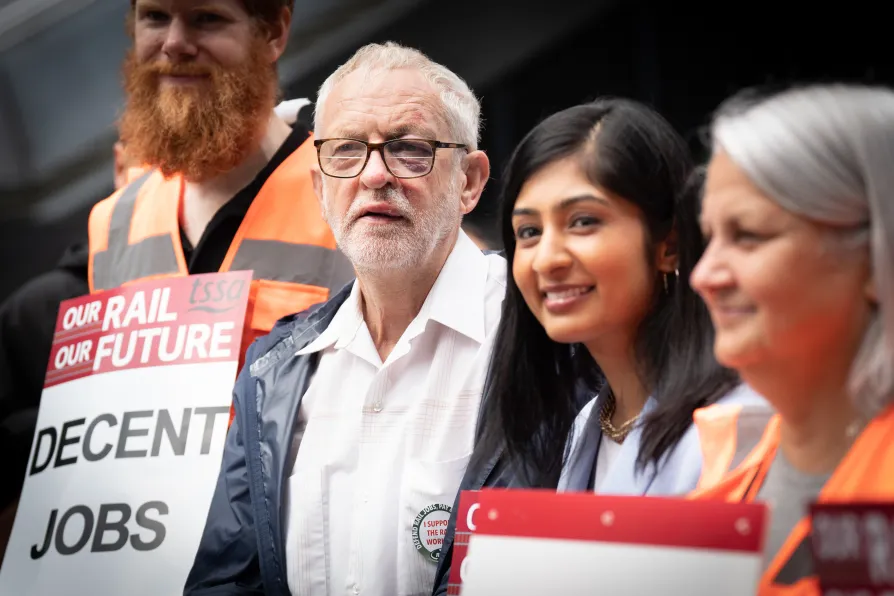John Wojcik pays tribute to a black US activist who spent six decades at the forefront of struggles for voting rights, economic justice and peace – reshaping US politics and inspiring movements worldwide
KEITH FLETT revisits debates about the name and structure of proposed working-class parties in the past

 Jeremy Corbyn (second left) and Zarah Sultana, MP for Coventry South (second right) on the picket line outside London Euston train station, August 18, 2022
Jeremy Corbyn (second left) and Zarah Sultana, MP for Coventry South (second right) on the picket line outside London Euston train station, August 18, 2022
THE media continues to pick up on the point that Zarah Sultana and Jeremy Corbyn’s new political formation, currently badged as “your party,” does not have an actual name. A BBC report made the point that the current names of UK political parties — Labour, Conservative, Liberal Democrat — have historic origins which don’t mean a great deal to many voters.
Strangely it did not mention the BBC’s favourite subject Reform. Deliberately or not the name has an ambiguity. Some might assume it means positive change. One historical meaning of the word is that of reaction rather than political progression.
The world’s first ever working-class party was formed 185 years ago in July 1840 in Manchester and named simply the National Charter Association. When left political parties formed on the rise of a new industrialised working class in the 1880s, we find the Social Democratic Federation (federation being a significant word here) and the Independent Labour Party (party being the key word).
The Glasgow Herald of January 14 1893 carried a report of the founding conference of the Independent Labour Party. The discussion focused on a name that would resonate with the working class supporters the new party was looking to engage with and get the support of. European social democracy preferred to use variations on that name, while the Labour Representation Committee in 1900 added another perspective.
George Carson of the Scottish Labour Party, argued that the title of the organisation should be “the Socialist Labour Party.”
London delegate AH Barjer proposed as an alternative “the Independent Labour Party,” and argued that there were large numbers of working men who were not yet prepared to adopt socialism as an entirety, yet who would be very glad to join a party which was established for the purpose of obtaining the independent representation of labour.
Ben Tillett strongly opposed Carson’s resolution, on the grounds that English trades unionism was better and stronger than any kind of socialism, whether English or foreign, and his desire was to capture trades unionism for the Independent Labour movement.
Carson, secretary of the general arrangement committee, strongly protested against the language used by Tillett.
After considerable discussion, the amendment was carried by a very large majority. The consequences meant that the ILP was able to build a geographically based branch structure but the SDF and Fabians remained outside and sometimes in competition with it.
Another issue was the construction of a representative leadership.
The principle was that there must be leaders representing different areas of the country. However all those from the first proposed leadership lived in London: Cunningham Graham, Scottish Labour Party; HH Champion, Scottish United Trades Council; Tom Mann, London ILP; H Quelch, London SDF; Ben Tillett, Yorkshire ILP; Stephen Fay, Manchester & Salford ILP.
In addition it was noted that the “Midlands and the north of England could nominate some ‘Midlander or Northerner’ provided they lived in London.”
WH Drew, president of the Bradford Labour Union, noted of the London plan “what you should set your face to is a conference of provincial men and Londoners, and you cockneys ought to unbend and come say to Bradford.”
The idea that a representative leadership should all live in London didn’t work. As EP Thompson noted in Homage to Tom Maguire, the new leadership of labour emerged not from “London head offices” but from “those shadowy parts known as the provinces.”
Of course these were discussions almost entirely amongst male socialists and trade unionists. The world has changed but some of the fundamental issues of structure and name remain relevant.









